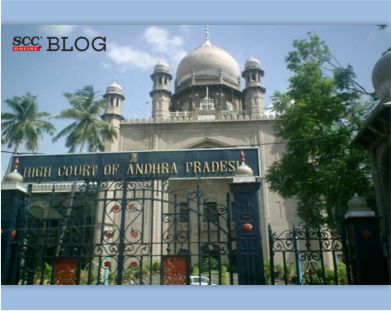Andhra Pradesh High Court: The Single Judge bench of the Dr. V.R.K. Krupa Sagar set aside the order of the Principal Junior Civil Judge, Chilakaluripet while rejecting the husband's plaint for declaration of a divorce decree upon pronouncement of triple talaq.
The civil revision petition was filed by the wife against the order of the Trial Court Judge who had dismissed her application for rejection of husband's plaint for obtaining a divorce decree, which was moved by him after pronouncing Triple Talaq.
The husband after pronouncing talaq thrice, informed his wife the very same day by way of a letter and intimated his Talaqnama to Anjuman Committee, Chilakaluripet as per Muslim Personal Law. He further filed a plaint before the Trial Court which was challenged by his wife for rejection of the plaint. The Trial Court, however, rejected the wife's challenge stating that it would conduct trial of the suit. The Trial Court while referring to Shayara Banu v. Union of India (2017) 9 SCC 1 was of the view that since the husband had filed the suit in 2016 and the Supreme Court judgment was pronounced in 2017, the plaint clearly disclosed the cause of action, even if the law laid down under Shayara Banu (Supra) case was the ‘Law of Land'. The Trial Court held that it could not be stated that the plaint is barred by any law prescribed under the provisions of Order VII Rule 11 (d) of Code of Civil Procedure, 1908 (‘C.P.C.')
Point for consideration
Whether the impugned order in refusing to reject the husband's plaint resulted in miscarriage of justice?
Court's Analysis
The Court referred to Section 2 of the Muslim Personal Law (Shariat) Application Act, 1937 (‘Muslim Personal Law') and stated that the object of the Act was to rule out customs and usage and apply Muslim Personal Law. The Court further navigated through section 2 (c) and 3 of Muslim Women (Protection of Rights on Marriage) Act, 2019 which declared the pronouncement of talaq by words (spoken or written) as void and illegal.
The Court alluded to Shayara Banu's (Supra) case wherein Section 2 of the Muslim Personal Law was declared as illegal and unconstitutional to the extent of dissolution of marriage by way of Triple Talaq.
The Court also relied on P.V. George v. State of Kerela (2007) 3 SCC 557 in which it was held that the law laid down by Supreme Court will have retrospective effect unless contrary is indicated in the judgment. Therefore, by virtue of the said judgment, the ratio in Shayara Banu's (Supra) case should be understood as one that is retrospective in nature. Thus, stated that the principle that emerges for comprehension is that the Triple Talaq was not in accordance with law and the plaint could not be processed for trial.
The Court while referring to Article 141 of the Constitution of India held that the law declared by the Supreme Court of India shall be binding on all Courts within the territory of India. Further, Article 144 of the Constitution of India mandates all authorities, civil and judicial, in the territory of India to act in aid of the Supreme Court and Order VII Rule 11(d) of C.P.C. mandates the Court to reject a plaint where the suit appears from the statement in the plaint to be barred by any law.
The Court stated that such declaration of law being unconstitutional is retrospective in nature which applies to the plaint in the present case where the Triple Talaq was claimed to have been pronounced by the husband.
“By the time the judgment is proposed to be rendered on such a plaint, the law available for the Court would be that there was no Triple Talaq. Therefore, the view of the trial Court that the ratio in Shayara Banu's case (supra) is not applicable retrospectively is incorrect.” observed the Court
Therefore, the Court allowed the revision petition in favour of the wife and set aside the order of the Trial Court.
[Shaik Jareena v. Shaik Dariyavali, Civil Writ Petition 2477 of 2019, decided on 05-01-2023]
Advocates who appeared in this case :
Rolla Madhavi, Advocate, for the Petitioner;
N. Srihari, Advocate, for the Respondent.








Good reporting